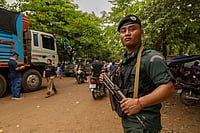Top military leaders from India and Pakistan exchanged sharp warnings at the Shangri-La Dialogue in Singapore on Saturday, bringing long-simmering regional tensions to the forefront of one of Asia’s most prominent defense summits, HT reported.
India’s Chief of Defense Staff (CDS) General Anil Chauhan and Pakistan’s Chairman of the Joint Chiefs of Staff Committee General Sahir Shamshad Mirza delivered starkly contrasting messages during simultaneous sessions at the high-profile forum, which drew defense leaders from across the world.
Speaking on India’s recent cross-border military action, Operation Sindoor, General Chauhan stated that New Delhi had redefined its "red line" on terrorism. “What India has done, politically, is draw a new red line of intolerance against terror,” he said, referring to the April 22 attack in Pahalgam, Jammu and Kashmir, where 26 tourists were killed. India has blamed Pakistan-based terror groups for the assault, a charge Islamabad denies.
“This operation lies in the military domain and should offer lessons to our adversary,” Chauhan added. “We have been subjected to this proxy war of terror for more than two decades. We’ve lost too many lives, and we want to put an end to it.”
Meanwhile, in a parallel session, General Mirza warned that continued crisis management without genuine resolution risks spiralling into uncontrolled conflict. “It has become imperative to move beyond conflict management towards conflict resolution,” he said during a panel on regional crisis mechanisms. “This will ensure sustainable peace.”
He reiterated Pakistan’s long-standing position on Kashmir, calling it the “core issue” between the two nations and pushing for its resolution in line with UN Security Council resolutions and the aspirations of the Kashmiri people.
“Given Indian policies, the absence of a crisis management mechanism may not give enough time for global powers to intervene and prevent escalation. They could be too late to stop the damage,” Mirza cautioned.
He accused India of avoiding dialogue on Kashmir, stating, “When there is no crisis, Kashmir is never discussed. But it's central to peace in the region.”
The high-level exchange comes as relations between the nuclear-armed neighbours have worsened, especially after Operation Sindoor — India’s targeted military action reportedly aimed at dismantling terror infrastructure across the Line of Control.
While global defense officials observed the interaction closely, analysts warned the rhetoric could further strain already-frozen bilateral ties, especially amid heightened regional instability and the absence of structured diplomatic or military dialogue between New Delhi and Islamabad.
The Shangri-La Dialogue, held from May 30 to June 1, brought together defense ministers and military chiefs from over 40 countries. But the spotlight this year was undeniably on India and Pakistan — whose confrontation once again underscored the fragile security balance in South Asia.














